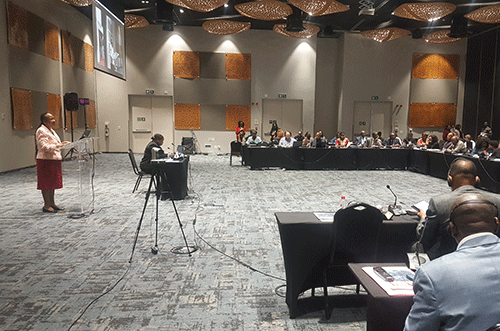Moses Magadza
Southern African Development Community (SADC) states have been urged to implement progressive domestication of Model Laws which can be a game changer and the endgame for infringements of sexual and reproductive health and rights (SRHR) in the region.
Secretary General of the SADC Parliamentary Forum Boemo Sekgoma made the suggestion when she presented the opening address to the Joint Session of Standing Committees of the Forum in Johannesburg, South Africa on 10 March 2023.
The meeting was held under the theme ‘Accelerating the domestication and Implementation of SADC Model Laws on Child Marriage and Gender-based Violence: Good Practices Challenges and Way Forward’.
Sekgoma described Model Laws as forward-looking normative legal standards which act as benchmarks for regional parliaments and enable them to accelerate the process of domestic decision-making.
“Since most SADC member states are dualist in nature, and thus regional norms are only persuasive unless incorporated by an Act of Parliament, the Forum does not stop with the adoption of a Model Law. It goes one step further to assist countries with the process of domestication in conjunction with its developmental partners, UNFPA and Equality Now,” she said.
Sekgoma stressed that the joint session was convened to discuss good practices, challenges and the way forward on domestication of the SADC Model Law on Child Marriage (2016) and the SADC Model Law on Gender-Based Violence (2021).
The joint session was also to look at the findings of the Scoping Assessment on the SADC Model Law on Child Marriage and its implementation in Eastern and Southern Africa. This would help to generate further information for MPs to devise and implement domestication strategies for the progressive application of the Model Laws at national level.
“Indeed, before proceeding with domestication, it is necessary to understand the prevailing gaps and challenges that are preventing the eradication of child marriage and GBV, and then work towards filling those gaps in collaboration with a multi-partnership framework at national level,” she said.
Sekgoma further told MPs that domestication called for continuous intervention strategies, and in this regard, the forum had established the Regional Parliamentary Model Laws Oversight Committee, a dedicated high-level organ to monitor the implementation of Model Laws in collaboration with national parliaments.
The SG further said the outcome of the session would be submitted to the Oversight Committee to refine its domestication strategies at institutional level with regards to the Model Law on Child Marriage and that on GBV.
“As we proceed, we must bear in mind that Model Laws have the potential to trigger ripple effects within but also outside of Parliament,” she said.
Sekgoma clarified that more than being a model, the Model Law acts as a guide for citizens, teachers, leaders, MPs and other stakeholders who have an interest in positive SRHR reform.
She said Model Laws have the power to ignite debates in the media and get government machinery moving forward to protect SRHR.
“Beyond being a legislative instrument, Model Laws are commonly used by MPs as advocacy tools in communities, schools or during public hearings,” she added.
According to Sekgoma, Model Laws are also used by civil society organisations to disseminate the desired norms, for instance, the need for children to pursue Comprehensive Sexuality Education in schools or the need for GBV complaints and proceedings to be conducted in confidentiality.
“Model Laws thus equip social activists with the right tools for them to pursue advocacy work at grassroots level and convince faith or religious leaders as well as citizens to adopt a change of mindset,” she argued.
Sekgoma said since Model Laws are adopted by elected Parliamentarians of the SADC region during the Plenary Assembly of the forum, they are democratic instruments made at regional level.
In other words, she said, they reflect the will of SADC citizens and have regional legitimacy.
“Since they are adopted by MPs as leaders within their communities, Model Laws also have powerful demystifying abilities in that they demonstrate that topics such as child marriage or gender-based violence are no longer unspeakable taboos.
“Indeed, if MPs can talk about them, and legislate through a Model Law, then citizens no longer feel ashamed to ring the alarm and report SRHR infringements to the authorities,” she reasoned.
Sekgoma maintained that since Model Laws are aligned with the Sustainable Development Goals (SDGs), they ensure that Parliaments are not led astray and are concerned with the main issues or gaps which need to be addressed for the sustainable agenda 2030 or the Global Goals to be fulfilled.
“Surely, at regional level, it would be impossible to implement the vision of Africa Agenda 2063 if child marriage is not addressed or if women are still living harsh inequalities through GBV or other SRHR infringements,” she said.
Sekgoma emphasised that consistent SRHR advocacy by MPs in favour of domestication can yield immediate, medium-term or long-term results.


